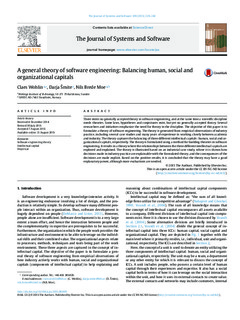| dc.contributor.author | Wohlin, Claes | |
| dc.contributor.author | Šmite, Darja | |
| dc.contributor.author | Moe, Nils Brede | |
| dc.date.accessioned | 2018-01-23T09:23:23Z | |
| dc.date.available | 2018-01-23T09:23:23Z | |
| dc.date.created | 2015-11-02T10:54:57Z | |
| dc.date.issued | 2015 | |
| dc.identifier.citation | Journal of Systems and Software. 2015, 109 229-242. | nb_NO |
| dc.identifier.issn | 0164-1212 | |
| dc.identifier.uri | http://hdl.handle.net/11250/2478950 | |
| dc.description.abstract | There exists no generally accepted theory in software engineering, and at the same time a scientific discipline needs theories. Some laws, hypotheses and conjectures exist, but yet no generally accepted theory. Several researchers and initiatives emphasize the need for theory in the discipline. The objective of this paper is to formulate a theory of software engineering. The theory is generated from empirical observations of industry practice, including several case studies and many years of experience in working closely between academia and industry. The theory captures the balancing of three different intellectual capitals: human, social and organizational capitals, respectively. The theory is formulated using a method for building theories in software engineering. It results in a theory where the relationships between the three different intellectual capitals are explored and explained. The theory is illustrated based on an industrial case study, where it is shown how decisions made in industry practice are explainable with the formulated theory, and the consequences of the decisions are made explicit. Based on the positive results, it is concluded that the theory may have a good explanatory power, although more evaluations are needed. | |
| dc.language.iso | eng | nb_NO |
| dc.rights | Attribution-NonCommercial-NoDerivatives 4.0 Internasjonal | * |
| dc.rights.uri | http://creativecommons.org/licenses/by-nc-nd/4.0/deed.no | * |
| dc.title | A general theory of software engineering: Balancing human, social and organizational capitals | nb_NO |
| dc.type | Journal article | nb_NO |
| dc.type | Peer reviewed | nb_NO |
| dc.description.version | publishedVersion | |
| dc.source.pagenumber | 229-242 | nb_NO |
| dc.source.volume | 109 | nb_NO |
| dc.source.journal | Journal of Systems and Software | nb_NO |
| dc.identifier.doi | 10.1016/j.jss.2015.08.009 | |
| dc.identifier.cristin | 1285267 | |
| dc.relation.project | Norges forskningsråd: 231679 | nb_NO |
| dc.relation.project | Norges forskningsråd: 235359 | nb_NO |
| cristin.unitcode | 7401,90,13,0 | |
| cristin.unitname | Systemutvikling og sikkerhet | |
| cristin.ispublished | true | |
| cristin.fulltext | original | |
| cristin.qualitycode | 2 | |

